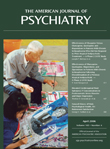Trajectories of PTSD: A 20-Year Longitudinal Study
Abstract
Objective: This study assessed the psychopathological effects of combat in veterans with and without combat stress reaction. Method: Veterans (N=214) from the 1982 Lebanon War were assessed in a prospective longitudinal design: 131 suffered from combat stress reaction during the war, and 83 did not. They were evaluated 1, 2, 3, and 20 years after the war. Results: Combat stress reaction is an important vulnerability marker. Veterans with combat stress reaction were 6.6 times more likely to endorse posttraumatic stress disorder (PTSD) at all four measurements, their PTSD was more severe, and they were at increased risk for exacerbation/reactivation. A qualitative analysis of the profile of PTSD symptoms revealed some time-related changes in the symptom configuration of veterans who did not suffer from combat stress reaction. In both groups, the course fluctuated; PTSD rates dropped 3 years postwar and rose again 17 years later; 23% of veterans without combat stress reaction reported delayed PTSD. Conclusions: These findings suggest that the detrimental effects of combat are deep and enduring and follow a complex course, especially in combat stress reaction casualties. The implications of aging and ongoing terror in impeding recovery from the psychological wounds of war are discussed.



